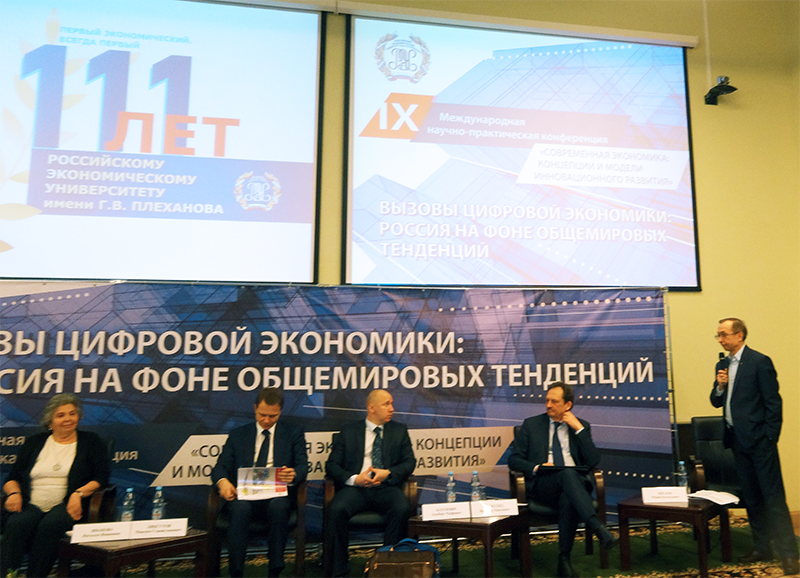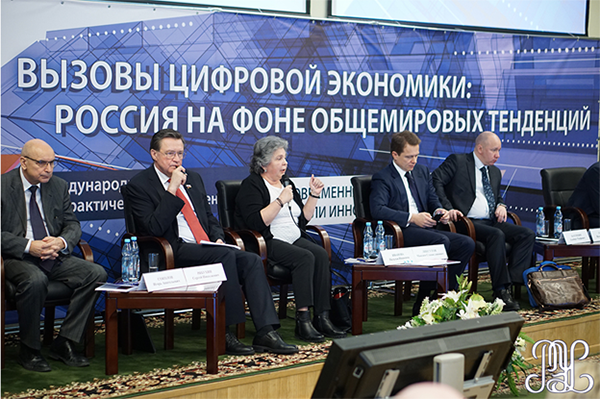|
 Traditionally, the event is
dedicated to the celebration of the 111th Anniversary of the
University celebrated this year. As always, the event is devoted to the most
topical issues of the modern Russian and world economy development. The agenda
includes the challenges of the digital economy and the role of Russia against the
global trends. These issues brought together representatives of almost all
centers of the scientific and educational community of the country, as well as
experts and lawmakers, who are engaged in the development of this sphere. Traditionally, the event is
dedicated to the celebration of the 111th Anniversary of the
University celebrated this year. As always, the event is devoted to the most
topical issues of the modern Russian and world economy development. The agenda
includes the challenges of the digital economy and the role of Russia against the
global trends. These issues brought together representatives of almost all
centers of the scientific and educational community of the country, as well as
experts and lawmakers, who are engaged in the development of this sphere.
The Plekhanov Russian University
very seriously considers the issues of its development
in this sphere of education. Opening the conference, Viktor Grishin, Rector of
the Plekhanov Russian University of Economics, said that at the last meeting of
the Academic Council it was decided to reconstruct the digital technology
building, which will unite all those who deal with this problem - economists,
ICT specialists, etc.
As scientists and experts admit, the main challenges in the digital economy
are the transformation from a conservative model to a technological one. Business
models of such companies as, for example, Uber and Alibaba Group, which are, in
fact, digital platforms, rather than the usual model enterprises. In the
meanwhile, the capitalization of business ùà such model only grows. The
speakers named Sberbank and Yandex as Russian examples of companies going along
this path, in which the development and volume of the digital technologies introduction
is on a huge scale.
 Director of the Federal Research Center “Informatics and Management” of the
Russian Academy of Sciences, Scientific Director of the National Center of
Excellence in the Field of Digital Economy of Lomonosov Moscow State University
Igor Sokolov reminded that the digital economy is a new concept for Russia,
which had officially born on December 1, 2016, when the President of the
Russian Federation had signed the Strategy of Scientific and Technological Development
of the country, and in his message to the Federal Assembly had designated this
sphere as a priority. Although, of course, these technologies have been
developing in our country for several years. In addition to deeply scientific
spheres, they also cover the people’s daily life activities, such as, for
example, banking services, education and transport. Director of the Federal Research Center “Informatics and Management” of the
Russian Academy of Sciences, Scientific Director of the National Center of
Excellence in the Field of Digital Economy of Lomonosov Moscow State University
Igor Sokolov reminded that the digital economy is a new concept for Russia,
which had officially born on December 1, 2016, when the President of the
Russian Federation had signed the Strategy of Scientific and Technological Development
of the country, and in his message to the Federal Assembly had designated this
sphere as a priority. Although, of course, these technologies have been
developing in our country for several years. In addition to deeply scientific
spheres, they also cover the people’s daily life activities, such as, for
example, banking services, education and transport.
Maxim Liksutov, Vice-Mayor of Moscow on transport issues, road and
transport infrastructure development told about the last one. According to him,
due to active introduction of the digital technologies, transport system of
Moscow has reached the values of indicators, which can be compared with the ones
of the most advanced megapolises. So, the ubiquitous Wi-Fi coverage in land and
underground transport is used by more than half of passengers, and, due to the
Big Data processing, the transport management system is able to more accurately
develop the traffic schedule.
Sergey Ryabukhin, Chairman of the Committee of the Federation Council on Budget
and Financial Markets spoke about the lawmaking in this area. Last year, two
basic documents were adopted. 26 laws are planned to be adopted in the current
year. They relate to e-commerce, crypto-currency, financial services, banking, data
in government procurement etc. According to the senator, in some cases, Russia
will have to adopt models of foreign partners, but there are also directions,
for example mobile applications, where Russia has a leading position. We are two-three
times ahead of world practice in this field. |

